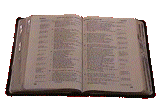

Psalm 18
Saul the first King of Israel
David the second King of Israel
2 SAMUEL
1) 2 Samuel 22 English Standard Version
(ESV)
David's Song of Deliverance
PSALM
2) Psalm 18 English Standard Version (ESV)
The Lord Is My Rock and My Fortress
To the choirmaster. A Psalm of
David, the servant of the Lord, who addressed the words of
this song to the Lord on the day when
the Lord delivered him from the hand of all his enemies, and from the
hand of Saul. He said:
God is Alive and
Well!
Psalm 18
An EasyEnglish
Translation with Notes
(about 1200 word
vocabulary) on Psalm 18
Peter got out of the boat. He walked on the sea towards Jesus. But
then Peter saw that the sea was very angry. Peter became very frightened. He
began to fall into the water. He shouted, "Save me, Lord".
Immediately, Jesus put out his hand. He held on to Peter. They both climbed into
the boat. The storm came to an end. (Part of Matthew 14:29-32.)
The story of Psalm 18
This is a very special psalm. It is so special that you will find
it in 2 places in the Bible. It is here in the Book of Psalms. It is also in a
part of the Bible that we call the Book of Samuel. Samuel is in 2 parts. I
Samuel tells the story of David before he became king of Israel. 2
Samuel tells us the story of David after he became king. 1 Samuel also tells us
about the lives of Samuel the prophet and Saul the king. Why is Psalm 18 in the
Book of Samuel? (2 Samuel 22) Because it is David's own story of his life. Here
we have put it in 6 parts. This gives help to everyone that reads it. It is
like 6 different psalms. We can study it like that. But we must read the whole
psalm to understand the life of David.. That is why it is also in 2
Samuel. The title (in brackets) of each part is not in the Hebrew Bible.
Psalm 18
(This is) for the music leader.
(It is) for the servant of the LORD.
(It is) for David.
David spoke the words of this song.
David did this when the LORD saved David from his enemies.
Also, when the LORD saved David from Saul.
David did this when the LORD saved David from his enemies.
Also, when the LORD saved David from Saul.
II. David asks for help – (18:4–6)
III. God answers David – (18:7–19)

IV. Why God gives help to people – (18:20–27)
V. Everything that David owns comes from God – (18:28–42)
VI. God made David king – (18:43–50)
Matthew Henry ::
Commentary on Psalms 18
Psalm 18
This psalm we
met with before, in the history of David's life, 2 Sa. 22. That was the first edition of it; here we have it revived, altered
a little, and fitted for the service of the church. It is David's thanksgiving
for the many deliverances God had wrought for him; these he desired always to
preserve fresh in his own memory and to diffuse and entail the knowledge of
them. It is an admirable composition. The poetry is very fine, the images are
bold, the expressions lofty, and every word is proper and significant; but the
piety far exceeds the poetry. Holy faith, and love, and joy, and praise, and
hope, are here lively, active, and upon the wing.
I. He triumphs in God (v. 1-3).
II. He magnifies the deliverances God had wrought for him (v. 4-19).
III. He takes the comfort of his integrity, which God had thereby
cleared up (v. 20-28).
IV. He gives to God the glory of all his achievements (v. 29-42).
V. He encourages himself with the expectation of what God would
further do for him and his (v. 43-50).
PSALM 18
Dr. Constable's
Notes on Psalms
As the title indicates, David wrote this psalm after he had
subdued his political enemies and had established the kingdom of Israel firmly
under his control. In this poem, David expressed his delight in the Lord and
thanked Him for giving him the victories he enjoyed. This royal thanksgiving psalm
also appears in 2 Samuel 22. The slight variations may be due to changes that
Israel's leaders made, under divine inspiration, when they adapted this poem
for use in Israel's public worship. Other individual psalms of
thanksgiving are 30—32, 40, 66, 92, 116, 118, and 120.
"The two components essential to the [individual
thanksgiving] genre are: (1) the psalmist's report about his crisis, and (2)
the statement or declaration that the crisis has passed and his deliverance is
an accomplished fact. The latter element is that which distinguishes these
psalms from the lament."
Delitzsch called this the "greatest of the Davidic
hymns" and "the longest of all the hymnic Psalms."
I. God's character (18:1–3)
II. God's deliverance (18:4–29)
III. God's blessings (18:30–50)
God's people should always acknowledge the magnificent
multifaceted character of our God. We should also recount His awesome acts of
deliverance for us. Furthermore, we should continue to rely on His future
faithfulness in view of who He is and what He has done for us.
Psalm 18 New American Bible (Revised Edition) (NABRE)
Psalm 18[a]
A King’s Thanksgiving for Victory
Footnotes:
a. Psalm
18 A royal thanksgiving for a military victory, duplicated
in 2 Sm 22.
Thanksgiving Psalms are in essence reports of divine rescue. The Psalm has two
parallel reports of rescue, the first told from a heavenly perspective (Ps 18:5–20), and the
second from an earthly perspective (Ps 18:36–46). The
first report adapts old mythic language of a cosmic battle between sea and
rainstorm in order to depict God’s rescue of the Israelite king from his
enemies. Each report has a short hymnic introduction (Ps 18:2–4, 32–36) and conclusion
(Ps 18:21–31, 47–50).
b. 18:3 My
saving horn: my strong savior. The horn referred to is the weapon of a bull and
the symbol of fertility, cf. 1 Sm 2:10; Ps 132:17; Lk 1:69.
c. 18:6 Cords:
hunting imagery, the cords of a snare.
d. 18:8–16 God
appears in the storm, which in Palestine comes from the west. The introduction
to the theophany (Ps 18:8–9) is
probably a description of a violent, hot, and dry east-wind storm. In the fall
transition period from the rainless summer to the rainy winter such storms
regularly precede the rains, cf. Ex 14:21–22.

e. 18:11 Cherub:
a winged creature, derived from myth, in the service of the deity (Gn 3:24; Ex 25:18–20; 37:6–9). Cherubim
were the throne bearers of the deity (Ps 80:2; 99:1; 1 Kgs 6:23–28; 8:6–8).
f. 18:15 Arrows:
lightning.
g. 18:35 Bow
of bronze: hyperbole for a bow difficult to bend and therefore capable of
propelling an arrow with great force.
I Love the Lord, His Strength is Mine

TESTIMONY: Hymn "I Love the Lord,
His Strength is Mine" (From Psalm 18)
Bible Dictionaries
ISBE Main Index:
The ISBE is part of SwordSearcher Bible Software.
 .
.My Pages




















Nenhum comentário:
Postar um comentário